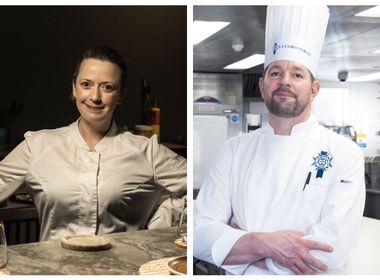
Le Cordon Bleu Event in Manchester
In partnership with Chef Caroline Martins, Le Cordon Bleu London alumna and founder of Restaurant SAMPA, Le Cordon Bleu presents a live cuisine demonstration ...
We recently had the pleasure of welcoming Rakesh Nair, head chef at the highly acclaimed Indian restaurant, The Cinnamon Club, to Le Cordon Bleu London for an exciting guest chef demonstration.
Rakesh was born in Varkala, India and having spent the majority of his childhood helping his mother in the kitchen, he discovered his passion for food. In 2002 Rakesh met Vivek Singh, who is now the executive chef and CEO of The Cinnamon Club. After bonding over their love of combining Indian flavours and western culinary styles, Vivek invited Rakesh to join his team as chef de partie at his renowned London restaurant. Since then Rakesh has rapidly progressed from sous chef, to senior sous chef, and finally to head chef, overseeing a twenty-strong team.
The hot topic of Rakesh’s guest chef demonstration was definitely spices, as the attentive audience kept the questions coming regarding this key characteristic of Indian cuisine. Rakesh covered a range of spice-related topics which Le Cordon Bleu lecturer Nitin Radhakrishnan has summarised as follows:
There are three different ways to identify spices. Basic spices which are commonly used in everyday cooking, usually in powder form which include red chilli, turmeric and cumin; then there are intermediate spices, usually whole, which are used occasionally to add more depth and flavour to a dish, and include such spices as clove, cardamom and nutmeg; and finally there are the premium spices that add a touch of luxury to a dish and include such spices as carom, fenugreek and saffron.
For culinary purposes, spices are used whole, crushed or ground, either singularly or mixed, in varying quantities. Whole spices are generally used at the beginning of the cooking process, single spices are used at an intermediate stage and crushed or mixed spices are usually added towards the end as they do not require as much cooking time.
Spices are also commonly used for medicinal purposes, for example turmeric paste is used as an antiseptic for wounds and burns, star anise is used for the pharmaceutical synthesis of anti-influenza drugs and saffron is used to treat depression.
Spices should be stored in airtight containers and away from direct sunlight. Whole spices usually last for around six months, whereas powdered spices start to lose their flavour after only a few weeks.
Chef Rakesh also discussed the importance of balancing the flavours in a dish, and the necessity of tasting the food throughout the cooking process to ensure that the dish is to your taste. He then touched on another important characteristic of Indian food, which is the vibrant colours. Rakesh explained that there is no need to use artificial food colouring as food can be coloured naturally using different spices.
The beautiful dish that Rakesh created for our lucky audience was spice-crusted sea bass in banana leaf with clove-smoked aubergine chutney and curried yoghurt, and the aroma alone was absolutely heavenly, filling the demonstration room and teasing everyone’s senses.
Whilst making the aubergine chutney, Rakesh showed the audience a very simple smoking technique using natural lumpwood charcoal. You place the chutney in a deep metal dish and place the live charcoal in the centre in a small bowl. You gently blow on the charcoal to get it smoking, and place your preferred spices (in this case cloves) on top of it in order to flavour the dish. You then drizzle some clarified butter on top and quickly cover with foil ensuring the smoke cannot escape. Then you just leave the chutney covered until the charcoal dies. Rakesh insisted that this method is much easier and cheaper than using a smoke machine and you can also use whatever spices you desire.
The evening was very interesting with Rakesh using his wealth of experience and knowledge to educate the audience about the different qualities of Indian food. Rakesh enthusiastically shared his tips and tricks throughout the night, in order for characteristic Indian flavours to be easily recreated at home. Le Cordon Bleu London would like to thank chef Rakesh for such an insightful demonstration and hopes that he continues to delight the masses with his beautiful culinary masterpieces.
Copyright © 2026 Le Cordon Bleu International B.V. All Rights Reserved.